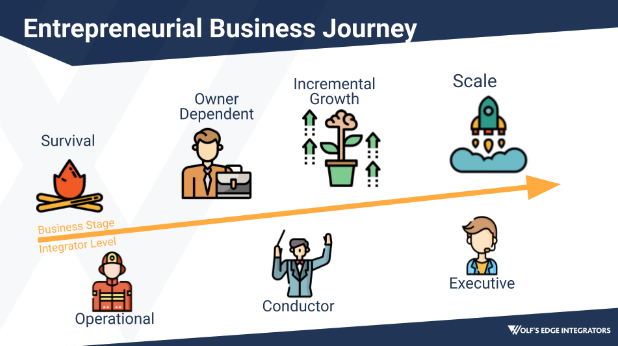When running a business grounded in the Entrepreneurial Operating System (EOS®), having a competent integrator can make the difference between scaling new heights and hitting a growth ceiling. But how do you know if your integrator EOS is truly effective?
Or, to put it bluntly, does your EOS integrator suck?.
In this blog, we explore the signs of a failing integrator, the importance of the process component in choosing an integrator, and how to ensure your business is on the right track with the right integrator.

What is an Integrator in business?
Before we dive into the signs of an ineffective integrator, it’s essential to answer the question: What is an integrator in business? In the EOS model, there are two key roles: visionaries and integrators.
The EOS integrator is the make-happen person who acts as the glue, holding the leadership team together and ensuring that everyone is aligned and moving toward the company’s vision.
Most entrepreneurs realize at some point that what got them here won’t get them there.
An integrator is responsible for executing the vision set by the Visionary, managing day-to-day operations, and driving accountability within the team. Whether it’s a full-time or fractional integrator, the right person can turn strategic plans into reality, while the wrong person can lead to misalignment, frustration, and stagnation.
Key Signs Your EOS Integrator Might Be Failing
Lack of Alignment with Vision:
One of the most significant responsibilities of an EOS Integrator is to align the team with the company’s vision.
If your Integrator seems out of sync with the Visionary or fails to communicate the vision effectively to the rest of the team, this is a serious concern.
Misalignment can lead to conflicting priorities, wasted resources, and, ultimately, failure to achieve the company’s long-term goals.
Ineffective Communication:
Communication is at the heart of effective leadership.
If your Integrator EOS struggles to communicate clearly with the leadership team or fails to disseminate information across the organization, it can lead to confusion, duplicated efforts, and missed opportunities.
This could manifest as unclear directives, inconsistent messaging, or a general lack of transparency.
Inability to Solve Problems Quickly:
An Integrator should be a problem-solver, someone who can identify issues and resolve them efficiently.
If unresolved problems constantly bog down your business or if your Integrator takes too long to make decisions, it might be time to reconsider their effectiveness.
Slow decision-making or poor problem-solving skills can stall growth and create frustration within the team.
Stalled Growth:
One of the clearest indicators that your EOS Integrator is not performing is a lack of business growth.
If your company is experiencing stagnation despite having a solid vision and strategy, it could be due to poor execution.
The Integrator is responsible for making the vision a reality, and if they are failing to do so, it’s a sign that something is wrong.
Lack of Accountability:
A strong Integrator drives accountability within the organization.
If your team members miss deadlines, fail to meet targets or rocks, or do not adhere to processes, this could indicate that your Integrator is not enforcing accountability.
This lack of discipline can erode the company’s culture and lead to underperformance.
The Crucial Role of Process in EOS and Why Your Integrator Should Care
Process is one of the six key components in the EOS Framework and refers to the development and documentation of core business processes that everyone in the organization needs to follow. Incorporating ace business rules into these processes ensures consistency, scalability, and efficiency in the way the business operates.
A great EOS Integrator understands that without solid processes, the business is at risk of inefficiency and inconsistency.
Here’s why Process is so critical:
- Ensures Consistency Across Operations: Well-defined processes ensure that everyone in the organization knows how to perform their tasks in a standardized manner. This consistency is crucial for maintaining quality and efficiency as the business scales.
- Supports Scalability: As a company grows, having documented processes allows new team members to onboard quickly and ensures that the quality of work remains consistent. Without these processes, scaling can lead to chaos, as different team members might do things their own way, leading to inefficiencies and errors.
- Drives Accountability: Processes clearly define who is responsible for what, reducing the likelihood of tasks falling through the cracks. This accountability is critical for maintaining momentum and ensuring that the company’s goals are met.
- Facilitates Continuous Improvement: Documented processes allow the company to review and improve the way things are done. This continuous improvement is vital for staying competitive and adapting to changes in the market.
If your Integrator does not emphasize the importance of processes, it could be a sign that they lack the discipline needed to run the business effectively. An Integrator who overlooks processes might be contributing to operational inefficiencies and hindering the company’s ability to scale.
How to Assess Your EOS Integrator?

If any of the signs mentioned above resonate with you, it might be time to assess your Integrator and whether they’re right for where your business is at.
Whether you’re evaluating a fractional integrator or reviewing a list of integrators for a new hire, it’s essential to match the integrator’s level with your company’s growth stage.
Use Assessments: Tools like the MOAA assessment offered by Wolf’s Edge Integrators can provide valuable insights into your Integrator’s performance. These assessments can help you identify specific areas where your Integrator is excelling and where they might be falling short.
If you’re not leveraging the power of process tools like whale [Service Page Link] what else might your Integrator be missing to help you get where you want to go?
That’s what the MOAA does it helps you understand;
- What stage your business is at today
- What level integrator you have
- What stage you want to be at
- What level of integrator you need to realize the vision and get there!
The 4 Stages of Business: Where are You?
Survival:
The business is bootstrapped, held together with duct tape and popsicle sticks, or it feels like you’re always fighting fires. The business isn’t stable week to week. You’re trapped in the business, not working on the business.
Owner Dependent:
In the best way possible, you’ve built yourself a job. Your business still has fires that you generally have to put out. If you slow down, so does the business (but it won’t shut down). You can take time off, but like any job, you’d have some serious catch-up to do.
Incremental Growth:
You’ve reached a level of stability where the prospect of other business ventures (or outside the business passions) feels in reach. The business doesn’t need your full attention. But you want it to grow consistently, create opportunities for your team, and give you the freedom to focus on the parts of the business you love but not be married to it.
Scale:
10x is the goal. You want to take this business to the moon. You’re ready to grow through strategic investment or rapid expansion. Instead of one location at a time, think three or four locations. You’re trying to make an evolutionary leap and capture a large swath of market share where available.
The 3 Levels of Integrator: Who Do You Need?
Operational: The doer:
They’re great at getting stuff done but often find themselves in fire-fighter mode, oftentimes extinguishing the same types of fires we put out last week and last month. This person is critically needed, and the Visionary/CEO isn’t holding everything, but they can’t drive things to become better tomorrow than they are today or develop high-potential managers and leaders under them.
Conductor: The director:
Someone to “conduct” the orchestra! You’re leaving chaos and moving into order. The meetings are run, and there are rules and consequences if they aren’t followed. You’re starting to experience accountability across the organization. The safety and systems are occasionally prioritized over growth. We work with what we have in front of us.
Executive: Air Traffic Controller:
Welcome to strategy and structure! Here we have a 360-degree view of the entire landscape. We can see from 30,000 feet to the ground level. We’re incentivized to simultaneously follow procedures AND increase efficiency well experimenting to expand and increase the speed of the entire system (business).

Bottom line? Don’t Settle for Less – Ensure Your Integrator Is Driving Success
Your EOS Integrator plays a critical role in your business’s success. If they’re not performing at their best, it can have a ripple effect throughout the organization, leading to misalignment, inefficiencies, and stalled growth.
By paying close attention to the signs of a failing Integrator and emphasizing the importance of the Process component in EOS, you can ensure that your business is on the right track.
Don’t settle for an Integrator who is holding your business back. Take the time to assess their performance, gather feedback, and make necessary changes to ensure that your business is poised for success.
If you suspect your Integrator isn’t up to par, consider taking a detailed assessment, like the one offered by Wolf’s Edge Integrators, to pinpoint the issues and explore actionable steps to get back on track.
Your business deserves a top-performing Integrator who can execute your vision and drive the company toward its goals. Make sure you have the right person in place to help you achieve success.
FAQs about an EOS Integrators
What is the integrators role?
An EOS® Integrator’s main role is to create a clear process for achieving the goals set by the Visionary.
What does an integrator EOS do?
An Integrator is the key person who ensures the smooth operation of the business by promoting clear communication and alignment across all teams. They focus on bringing together critical business functions—such as sales, marketing, operations, and finance—creating a productive balance that pushes the company towards achieving its goals.
What are the common job titles for an EOS Integrator?
In an EOS (Entrepreneurial Operating System) framework, typical job titles for an Integrator role include positions like President, Chief Operating Officer (COO), Head of Staff, VP of Operations, or General Manager. Each of these titles reflects the Integrator’s role in aligning the company’s operations and executing its vision.



